On February 6, 2023, Google announced its chatbot (like ChatGpt), Bard. And guess what?
The very next day, Microsoft launched a new version of Bing search powered by OpenAI, increasing the competition with Google.
“AI will fundamentally change every software category, starting with the largest category of all – search,” said Satya Nadella, Chairman and CEO, Microsoft.
Quick fact- Google currently processes, on average, over 40,000 search requests every second. This equals to more than 3.5 billion searches per day and 1.2 trillion searches per year all over the world.
Yeah. This is how crucial a role search engines play in our everyday lives, acting as a gateway to the vast world of information accessible on the internet.
Now, Google has been (without a doubt) the leader of the search engine industry for decades, but Bing is also preparing for something big now.
In this blog post, we will explore a comprehensive comparison between Bing and Google beyond the surface-level differences in user interface and delve into a deeper analysis of their algorithms, ranking factors, and the quality of search results.
Introduction to Search Engines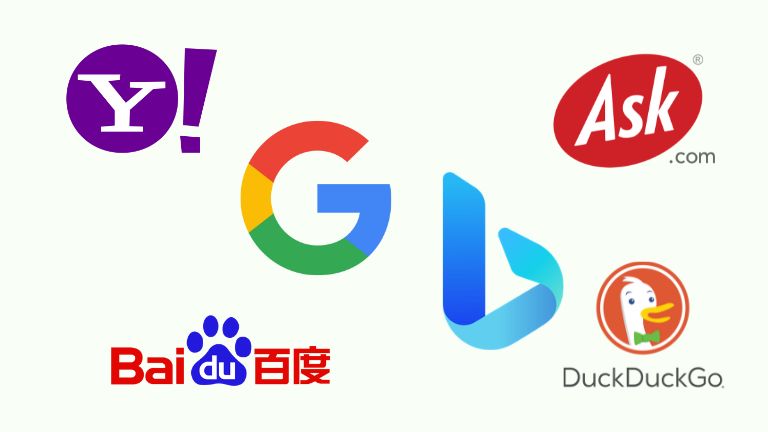
Whether we’re looking for a recipe, checking the weather, or researching a topic for work or school, we can do it with just a few keystrokes.
“Have you googled her yet?”. It actually became a thing- ‘googling’. American television and pop culture made it happen. But it all started when Larry Page posted on a mailing list, “Have fun and keep googling!”, on July 8, 1998.
Obviously, you’ve heard of Google as well as Bing and Yahoo, right? You also might have heard about Baidu, primarily used in China. Some other popular search engines include Yandex, Ask, Mojeek, DuckDuckGo, and Ecosia.
However, Google with 84.69%, and Bing with 8.85% market share in the search engine market are two of the most widely used search engines worldwide.
Some cool facts about search engines:
- Almost 76% of China’s search engine market is dominated by Baidu.
- In 2020, Russia was the nation with the most requests for content removal.
- An estimated 93% of all website traffic comes from search engines.
- Google searches related to local information add up to 46% of all searches.
- At least once a month, 98% of all internet users visit a search engine.
We’ll give a thorough comparison of Bing and Google in this blog post. We will look at how they differ in terms of user interface, extra features, and ranking considerations.
A Brief History of Bing and Google
It seems like Google and Bing have been there forever, right?
But you may not know that Google was founded in a garage by two Stanford students and Bing was created from the ashes of MSN Search.
Google may be the leader in search but don’t count out Bing, the scrappy underdog that’s always nipping at its heels. It’s a battle for the ages – will the giant remain on top, or will the upstart take the crown? Only time (and millions of search queries) will tell!
Origins of Google and How It Quickly Became Popular
Two PhD students – Larry Page and Sergey Brin – established a research project, “Backrub”, at Stanford University in 1996. Backrub was created to assist researchers in finding the most relevant articles based on citations from other papers.
Page and Brin soon realised that their technology could be extremely useful in terms of search engines on the internet.
In 1998, they founded Google Inc. and introduced the Google search engine. Google quickly gained popularity because it returned more relevant results than other search engines at the time. Google quickly surpassed all other search engines in terms of popularity by 2002.
Bing as Microsoft’s Attempt To Compete With Google
Microsoft introduced Bing in 2009. It was created as a smarter, more user-friendly, and more visually appealing alternative. At that time, Satya Nadella was the Senior Vice President of Microsoft’s Internet Services Division (and is currently the CEO of Microsoft).
Although Bing had captured 10% of the US search market a year after its debut, it was still unsuccessful due to Google’s massive popularity.
This meant that Bing would give users access to additional data including reviews, ratings, and directions in addition to search results. With a daily-changing background image, Bing’s user interface was also different from Google’s.
Despite these initiatives, Bing has found it difficult to challenge Google’s market leadership in the search engine industry.
Growth and Evolution Of Bing
Bing has expanded and changed ever since it was first introduced.
The name ‘Bing’ was selected for the reason that it would work well as a URL around the world because it was catchy, short, and easy to spell. The sound of the phrase would trigger memories of “the moment of discovery and decision making” in people’s minds.
In order to integrate social media results into Bing’s search results, Microsoft and Facebook collaborated in 2012. Bing Snapshot, a new feature that Microsoft unveiled in 2013, gives users pertinent data about a search query.
Now, Bing has established itself as a major player in the search engine industry when it announced its collaboration with OpenAI. The new Bing provides you with accurate results that fully address your queries. It does, of course, cite the sources.
Their tagline: “Ask real questions. Get complete answers. Chat and create.”
According to bing: We can see it as a chatbot like ChatGPT but a web version of it. We can now ask questions however we like. Even after a complex search, instead of being overwhelmed by choices, it will generate straight answers.
We can also do follow-ups and refinements in chat.
Not only that, whether it’s an email or meal plan, we can just provide our ideas and prompts, and Bing will write a draft for us to build upon the rest.
It’s best to think of it as an assistant. Not a content creator!
AI Competition: ChatGPT+Bing and Google Bard
The competition between Google and Microsoft in the field of artificial intelligence (AI) has been heating up, particularly in the area of search engines. Both companies have recently announced plans to enhance their search capabilities with AI [1][2].
In particular, Microsoft has integrated the ChatGPT AI language model into its Bing search engine, while Google has launched a new chatbot called Bard that uses AI to answer questions and carry out tasks for users [3].
While the competition between these tech giants can be beneficial for the advancement of AI in the search engine market, it can also have negative consequences for smaller AI companies and the future of AI research as a whole [4]. The rapid pace of innovation and deployment in this field can also have broader effects, such as ethical and societal considerations around the use of AI [5].
Overall, the AI competition between Microsoft and Google in the search engine space is pushing the boundaries of what is possible with AI and driving innovation in the field. However, it is important to consider the potential consequences and ethical implications of this rapidly evolving technology.
Differences Between Bing and Google
Google and Bing may have their differences, of course. But one thing for sure – with just a few clicks of a button, our curious minds can turn into instant experts, and they made it possible.
These search engines are like a magic wand that opens a portal to the infinite knowledge of the internet, whether it’s the lightning-fast results of Google or the stunning visuals of Bing.
By the way, which one are you, a googler or a binger?
User Interface
The user interface of Bing and Google is one of the key distinctions between both.
With a clean and minimalist layout, lightning-fast results, and an intuitive search bar, Google search is the MVP of user interfaces, too.
If Google is the LeBron James of search engines, then Bing is like the Steph Curry of search engines – smooth, stylish, and deadly accurate. The user interface of Bing search is like a work of art, with its visually stunning homepage images and immersive search results.
It’s like walking into a museum and discovering a hidden gem on every wall. But don’t be fooled by its beauty, Bing is also a powerhouse search engine, with powerful features like its advanced image and video search capabilities.
And just like Steph Curry’s killer 3-point shots, Bing’s search suggestions and autocomplete function are eerily accurate, making your search experience faster and more efficient.
So if you want to step up your search game, put on your virtual sneakers and give Bing a try.
Ranking Factors
The way Bing and Google rank search results is another significant distinction. Both search engines use sophisticated algorithms to choose which results to show, based on various ranking criteria.
For example, Bing rewards websites based on social signals such as ‘likes’ and ‘shares’ on social networking sites, whereas Google gives links and page authority more priority.
Local search also differs between the two search engines. While Google tends to favour its own local listings and may show fewer third-party results, Bing offers more thorough and extensive local search results, including user reviews and ratings.
Moreover, Bing and Google use different methods to offer news and information. For news-related searches, Bing frequently offers a more visual experience, with photos and videos appearing alongside text-based results.
Google, on the other hand, might favour news from reputable news sources and prominently display top stories.
In the end, the search results that users view may change in terms of ranking in Bing and Google. Despite the fact that both search engines want to provide users with the most relevant results, the ranking factors and user interface differences may result in users having different experiences depending on their search queries and preferences.
Bing vs Google: Differences in Ranking Factors
Bing and Google both have their own unique set of ranking factors, that determine which websites appear at the top of the search results.
While Google is known for its focus on content quality and backlinks, Bing is all about domain age, social signals, and multimedia content.
It’s like comparing a classic boxing style to a flashy MMA fighter, both are effective in their own way. So if you’re a website owner trying to rank higher in search results, you’ll need to tailor your strategy to fit the strengths.
Technical SEO, Metadata, and Domain Authority (DA)
In terms of technical SEO, Bing and Google have the most obvious distinctions. Technical SEO components such as page load time and website security are highly valued by both search engines.
But to understand the content of a page, Bing appears to look at metadata more carefully than Google. It pays greater attention to meta tags and descriptions than Google does.
Google would not even always show the metadata provided by the website owner. They might change it if they see fit.
Moreover, Bing appears to favour official domain types like.gov or.edu, which may have an effect on ranks for specific queries. This raises a sense of credibility in the user’s eyes.
Social Signals, Multimedia, and Mobile-first Indexing
Now, another difference between Bing and Google is how much emphasis they put on multimedia content and social signals. When ranking pages, Bing considers social signals such as likes and shares on social networking platforms.
Moreover, Bing prioritises multimedia information more than Google does, including videos and images.
Google, on the other hand, has changed to a mobile-first indexing strategy, which suggests that websites that are optimised for mobile devices will likely rank higher.
This change is due to the rise in the number of users using mobile devices to access the internet. Mobile devices account for 89% of Google’s traffic.
Backlinks: Quantity or Quality
Bing and Google both have algorithms for judging the authority of a page through backlinks.
Sometimes, only the quantity of backlinks can help a page to outperform the existing top-ranking results. However, the links should all be relevant. So, buying off links on other pages doesn’t count.
And sometimes, only a few backlinks can help a page to rank better if- the competition is low and the links are from higher authoritative sites.
Although backlinks are taken into account by both search engines when determining rankings, Bing appears to give more importance to the quality of links.
On the other side, Google now takes a more comprehensive approach in terms of ranking, giving importance to relevancy, user experience, and content quality.
Bing vs Google: Beyond Ranking Factors
When it comes to the ultimate search engine showdown, Bing and Google go toe-to-toe. Not just in ranking factors, but also in user experience, features, and overall search dominance.
SERP Features
Google offers a number of SERP features. One of them is Google Flights- which enables individuals to search for and compare flights straight from the search results page.
Another feature is Google Scholar which gives users access to academic papers and scholarly publications. It makes it a very effective tool for researchers and academics.
Bing, on the other hand- provides an amazing image and visual search experience and is more visually engaging.
Users can access detailed information on photos and movies, such as metadata, size, and resolution, via Bing itself. Customers can easily get the ideal image for their requirements by searching for images by colour or style as well.
Voice Search
Both search engines are strong in terms of voice search. However, Google is very well known for its powerful speech recognition technology.
It offers customers a very precise voice search experience. We can also see the use of this technology to perform very effectively in YouTube as well.
In contrast, Bing voice search is famous for its conversational search functionality. It lets users ask queries in a more natural and conversational manner.
Comparison of Maps
Looking for a restaurant nearby or maybe a park or a shopping mall? No worries. Maps by Google and Bing have got you covered.
Both maps help customers with directions, and finding what they’re looking for. But Google Maps is more widely used than Bing Maps. However, Bing maps offer some distinctive features including its bird’s eye perspective and 3D graphics.
Paid Advertising
Google and Bing both use paid advertising, but in different ways. The majority of Google’s paid advertising is keyword-based, with advertisers bidding on particular queries to show their advertisements to viewers.
Contrarily, Bing enables advertisers to tailor their advertisements based on factors like region, gender, and age.
Bing vs Google: Paid Advertising
If you’re in the digital marketing industry, you must know about paid advertising platforms such as Bing and Google which are constantly vying for attention, with each offering its own unique features and advantages to help businesses stand out in the digital crowd.
Brief history of Google Ads and Microsoft Advertising
The most well-known paid advertising platform internationally, Google Ads, formerly known as Google AdWords, was introduced in 2000.
Google Ads, with its massive reach and diverse advertising formats, is like Superman – able to leap tall buildings in a single bound and reach audiences across the web, from search to video to display ads.
For example, a business looking to promote its new product launch can use Google Ads’ shopping campaigns to showcase its products in search results or use YouTube video ads to engage potential customers with compelling product demos.
Another popular paid advertising platform is Microsoft Advertising, formerly Bing Ads, which was introduced in 2006. This is like Batman – a savvy detective who knows how to find and target the right audience with precision.
For instance, a business can use Microsoft Advertising to target specific audiences based on their job title or industry or use LinkedIn profile targeting to reach business professionals with high purchase intent.
Advertisers can bid for ad placement in Bing search results and on partner websites by targeting their ads to particular demographics like age, gender, and region.
Ultimately, both Google Ads and Microsoft Advertising have their own strengths and can be used effectively depending on a business’s specific goals and target audience.
So whether you need a superhero with superpowers or a cunning detective, Google Ads and Microsoft Advertising have got your back.
Differences Between Google Ads and Microsoft Advertising
One of the main distinctions between Google Ads and Microsoft Advertising are their targeting options.
Many targeting options are available in Google AdWords, including the ability to target particular websites and apps as well as keywords, demographics, and interests.
Microsoft Advertising, on the other hand, concentrates on location and demographics and provides fewer targeting choices.
While both platforms provide comparable ad types, Google Ads has a bigger selection and is frequently more creative when it comes to developing new ad formats.
For example, responsive search advertisements were created by Google Ads, which utilise machine learning to automatically create and improve ad headlines and descriptions.
To sum up, we can say that Google has dominance in paid advertising because Microsoft Advertising has a relatively lesser market share, between 5 and 10%. And Google ads control over 90% of the sponsored search market.
Bing vs Google: Rounding Up
Here is a summary of the key differences between Bing and Google:
| Feature | Bing | |
|---|---|---|
| User Interface | Visually immersive with changing background | Minimalistic with plain white background |
| Ranking Factors | Emphasis on metadata and and official domain types | Emphasis content quality, user experience and relevance |
| Local Search | Detailed and comprehensive local search results with user reviews and ratings | Focus on google's own local listings with fewer third-party results |
| Multimedia Content | Emphasis on images and videos with related media appearing in search results | Focus on text-based results with additional features like Google Images and Youtube |
| Voice Search | Conversational search capabilities | Powerful voice recognition technology |
| Paid Advertising | Focus on demographic and location targetting | Wide range of targetting options, including keywords, demographics and interests |
Whether to choose Bing or Google, ultimately comes down to personal preferences and requirements. Because they both have their own strengths and weaknesses that can make all the difference in your search experience.
The greatest search engine for you would be the one that delivers the most relevant and helpful results for your needs, regardless of whether it’s the aesthetic experience of Bing or the strong algorithms of Google.
Whether you’re a die-hard Google user or a loyal Bing fan, don’t forget to try the other options as well.
Frequently Asked Questions About Search Engines
How Many People Use Bing Vs Google?
Google Search (January 2023) has more than 1 billion daily active users while Bing has just reached a new milestone of 100 million. Although Google dominates the market with an 84.69% share in the search market, Bing started showing serious challenges when it launched its New Bing (integrated with ChatGPT) and Microsoft 365 Copilot. And now, Bing has a share of 8.85% and it’s going up.
Google Vs Bing Which Is Better?
With the help of a massive database, powerful algorithms, and a complete ecosystem, Google always performs better in terms of delivering the most relevant and useful results for a specific query. However, the New Bing can prove otherwise if it can stay in the market with persistence. Ultimately, which one you prefer depends on your personal preferences and what you’re looking for.
Why Would Someone Use Bing Over Google?
The new Bing provides an improved version of the familiar search experience, providing more relevant results that are as good as or better than Google’s. It also offers complete answers and a new chat experience where Bing has brought together search, browsing, and chat into one unified experience you can get from anywhere on the web. On top of that, with Bing’s content creation tools, we can turn information into action and make it faster and easier to go from searching to doing.
What Is The Main Difference Between Google and Bing?
The main difference between Google and Bing is that Bing provides a much better video search results page while Google comes fully featured. Bing’s video page provides a grid view of large thumbnails instead of Google’s vertical list of small thumbnails. [1] [2]
Key takeaway
Our daily lives have become much more dependent on search engines since they give us easy access to an enormous amount of knowledge.
Search engines like Google and Bing are essential in assisting us in finding the information we seek, whether we are looking for answers to our inquiries or performing research for work or school.
We advise people to use both Google and Bing and then decide which one they prefer. Users should select the search engine that best meets their demands because each search engine has unique strengths and limitations.
There is a search engine out there for everyone, whether they prefer the visually engaging experience of Bing or the powerful algorithms of Google.
We hope this blog piece has given you insightful knowledge about the distinctions between Bing and Google. If you find it useful, share it with others or leave a comment with your own insights on how you’ve used various search engines.

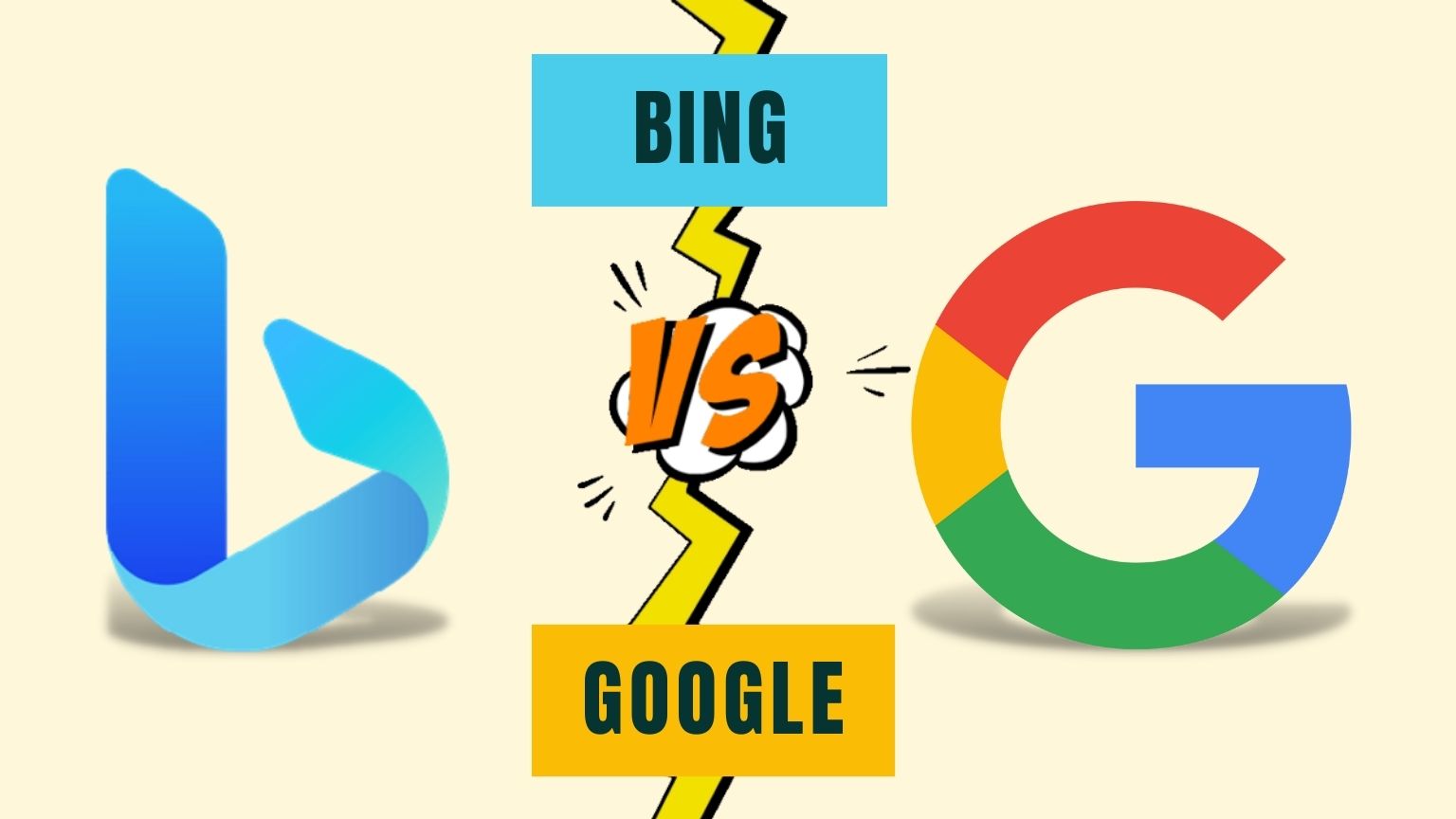
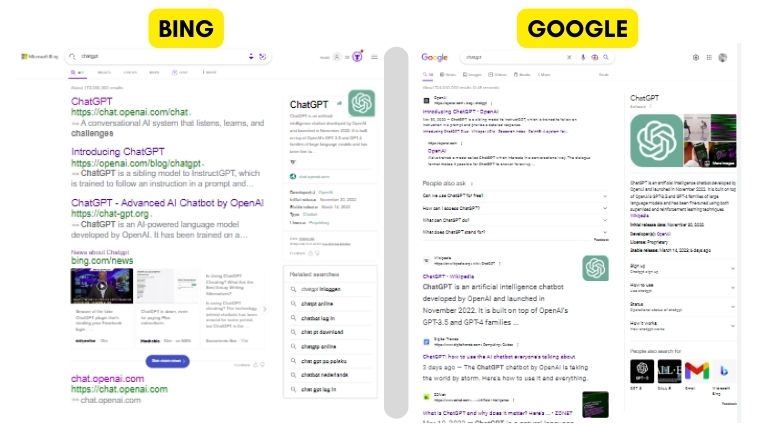
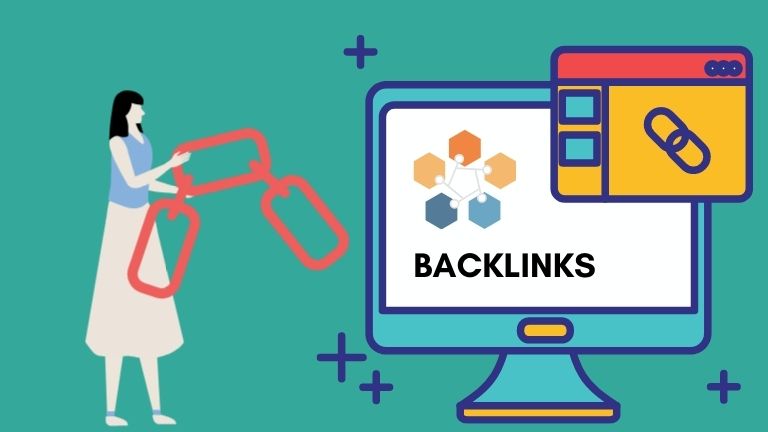
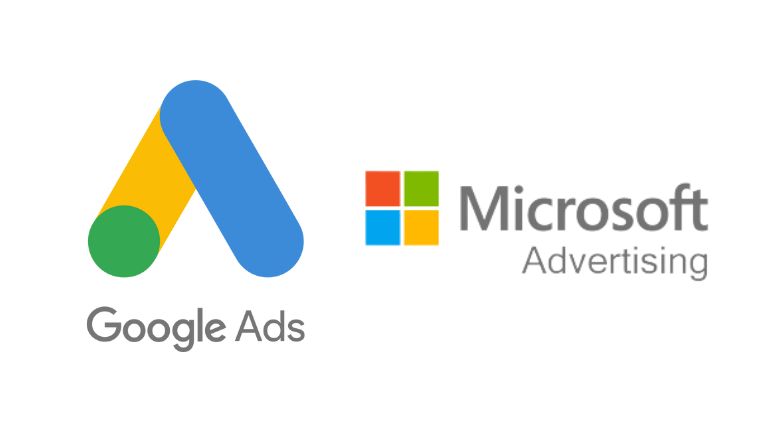








Leave a Comment